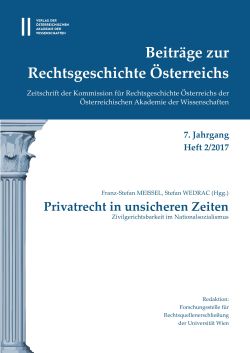

Beiträge zur Rechtsgeschichte Österreichs 2 / 2017, pp. 204-215, 2017/12/20
Privatrecht in unsicheren Zeiten
Zivilgerichtsbarkeit im Nationalsozialismus

When Nazi Germany annexed Austria in 1938, German decrees on 'de-Jewification' ('Entjudung') or 'Aryanization' ('Arisierung') were applied to 'Jewish' enterprises in Austria. As the jurisdiction of the Reichsgericht (German Supreme Court) was eventually extended to Austria, the Reichsgericht had to rule on several Austrian lawsuits regarding the 'de-Jewification', In two cases, the II. Zivilsenat (special section of the Reichsgericht ruling on business law) refrained from arbitrating the disputes between several Austrian looters ('Ariseure') of 'Jewish' enterprises, refusing to privilege one looter over another. In a third case, the court confirmed that the 'Aryan' widow of a former chairman of a 'Jewish' corporation was entitled to the full amount of pension earnings, stating that the merits of the chairman and the previous Jewish owners should be rewarded. However, the II. Zivilsenat of the Reichsgericht accepted the decrees on 'de-Jewification' as binding statutory law. This article tells the story of these three particular lawsuits within the context of other business law cases in Nazi Germany.
Keywords: Anti-Semitism - Annexation of Austria - Business Law - German Law - German Supreme Court - Nazi Germany